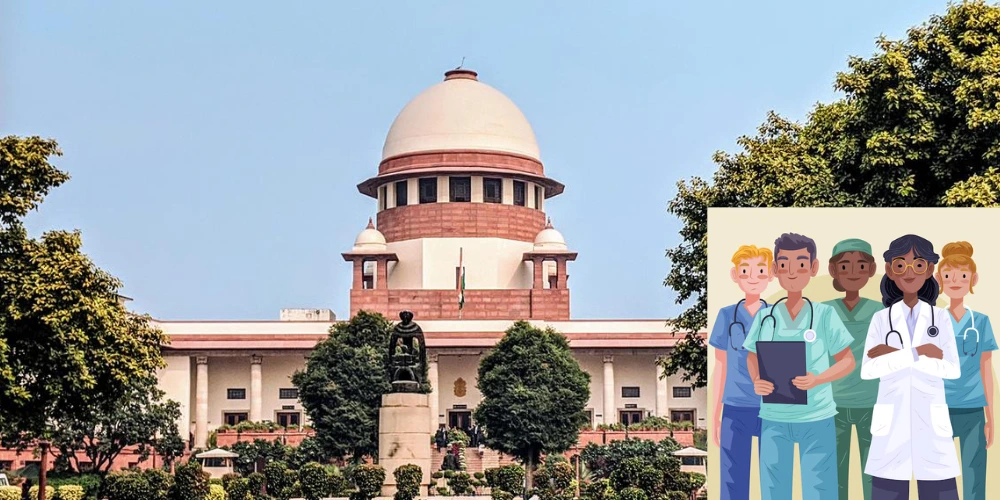
The Supreme Court on Tuesday (November 18) questioned the Union Government on whether it intends to give legal force to the Uniform Code of Pharmaceutical Marketing Practices (UCPMP), 2024, noting that the existing voluntary system leaves consumers unprotected and lacks an effective enforcement structure against unethical practices by pharmaceutical companies.
Although Additional Solicitor General KM Nataraj argued that the 2024 UCPMP marks a shift from the fully voluntary 2015 Code to a mandatory framework, Justice Sandeep Mehta observed that the Ethics Committees proposed in the new Code remain largely industry-driven. “Where is the government’s control?” he asked, suggesting that the simplest solution would be to issue a control order under the Essential Commodities Act. Embedding UCPMP within such an order, the bench said, would give it real enforceability.
The bench of Justice Vikram Nath and Justice Sandeep Mehta was hearing a petition filed by the Federation of Medical and Sales Representatives Associations of India (FMRAI), which seeks statutory regulation of pharmaceutical marketing practices to prevent unethical engagement between companies and doctors.
The Court directed FMRAI to detail how a statutory regime should operate—what the Code should contain, what procedures should apply, and which independent body should handle complaints. The bench also indicated that it may issue interim guidelines, on the lines of the Vishakha guidelines, until the government establishes a legislative framework.
Senior Advocate Sanjay Parikh, appearing for the petitioners, submitted that the current legal setup penalises only doctors who accept gifts or benefits, while pharmaceutical companies offering such inducements face no statutory consequences. This, he said, promotes irrational prescriptions, overpriced medicines and harmful combinations, thereby infringing the right to health under Article 21. He highlighted that nearly 47% of drug combinations in the market have been classified as irrational, with many resurfacing despite repeated bans. He also referred to parliamentary reports and documents pointing to collusion between manufacturers, medical experts and regulators.
ASG Nataraj responded that the revised UCPMP 2024 addresses most concerns. He pointed out that the new Code provides for ethics committees, complaint portals, appeal structures, auditors, reprimands and penalties such as suspension and expulsion from associations, arguing that these elements transform the Code into an “enforceable, system-backed framework.” He added that these mechanisms operate in addition to those under the Drugs and Cosmetics Act.
However, Justice Mehta noted that the Drugs and Cosmetics Act offers no direct remedy to patients or consumers, since prosecutions can only be initiated by drug inspectors. He questioned how an ordinary person could challenge unethical practices under such a system. When the ASG suggested that consumers could file complaints under UCPMP, the Court highlighted practical barriers such as the mandatory ₹1,000 deposit and the difficulty of obtaining details like the names of company directors. “Ninety per cent of complaints fail because this information is unavailable. What do you expect the consumer to do?” Justice Mehta remarked, emphasising the need for a truly accessible mechanism.
The bench reiterated that despite claims of a mandatory regime, the UCPMP remains “virtually voluntary” without government oversight. Referring to earlier government admissions that a voluntary code was ineffective, the Court pressed the ASG on whether the Centre plans to implement a statutory system. It also pointed out that a draft Drugs (Control Marketing) Order had been proposed in 2017 under the Essential Commodities Act but was never enacted.
Justice Mehta again suggested that issuing a statutory control order incorporating UCPMP would be the most straightforward approach. The ASG said he would seek instructions from the government on whether a stronger mechanism could be considered.
The Court granted time for both parties to file their suggestions and for the government to respond, listing the matter for hearing on December 16.
In an earlier hearing in May 2025, the Court had orally observed that bribery of doctors by pharmaceutical companies could be curbed if doctors were legally required to prescribe generic medicines.
Case No.: W.P.(C) No. 323/2021
Case Title: Federation of Medical and Sales Representatives Associations of India & Ors. v. Union of India & Ors.
Website designed, developed and maintained by webexy